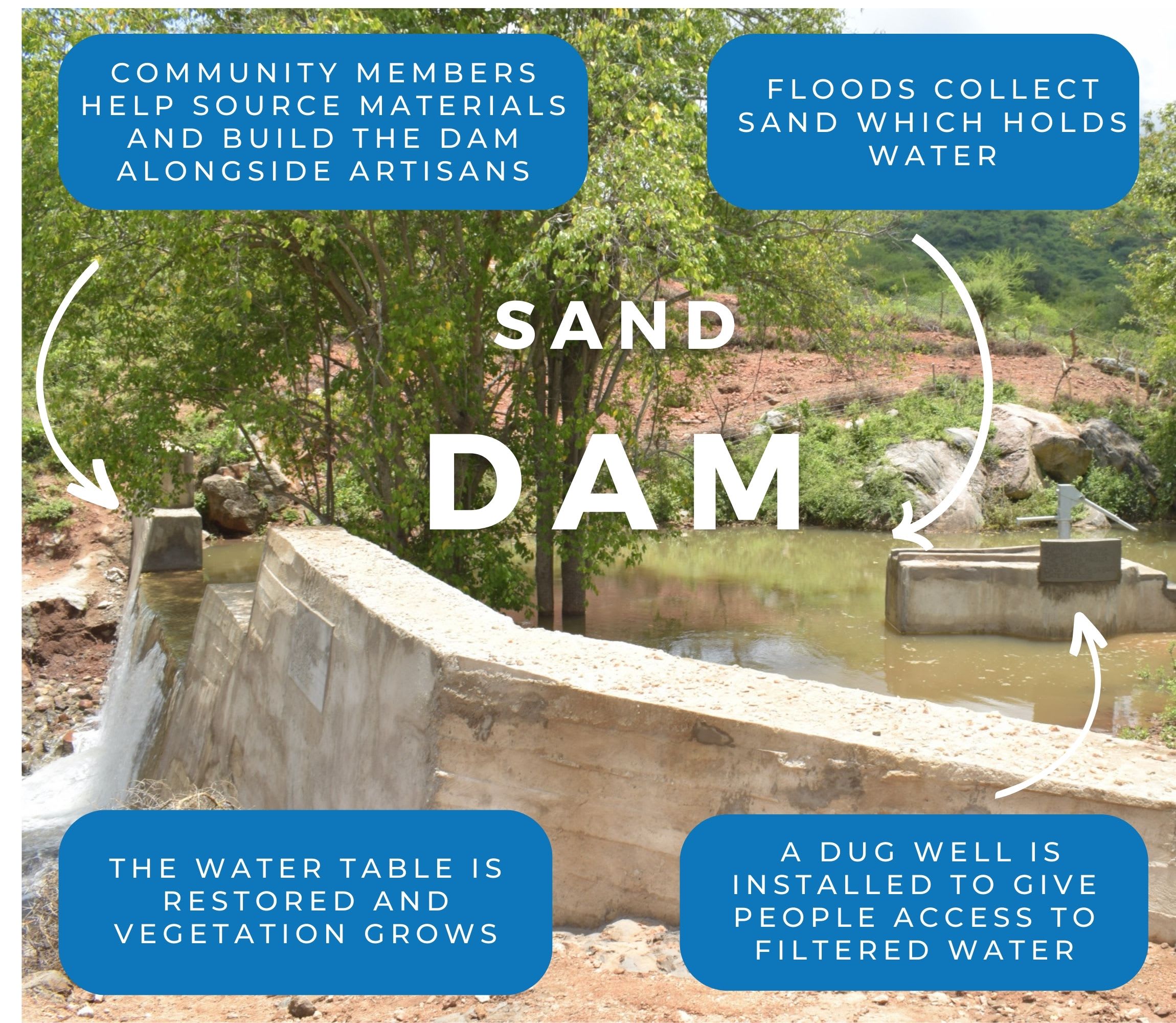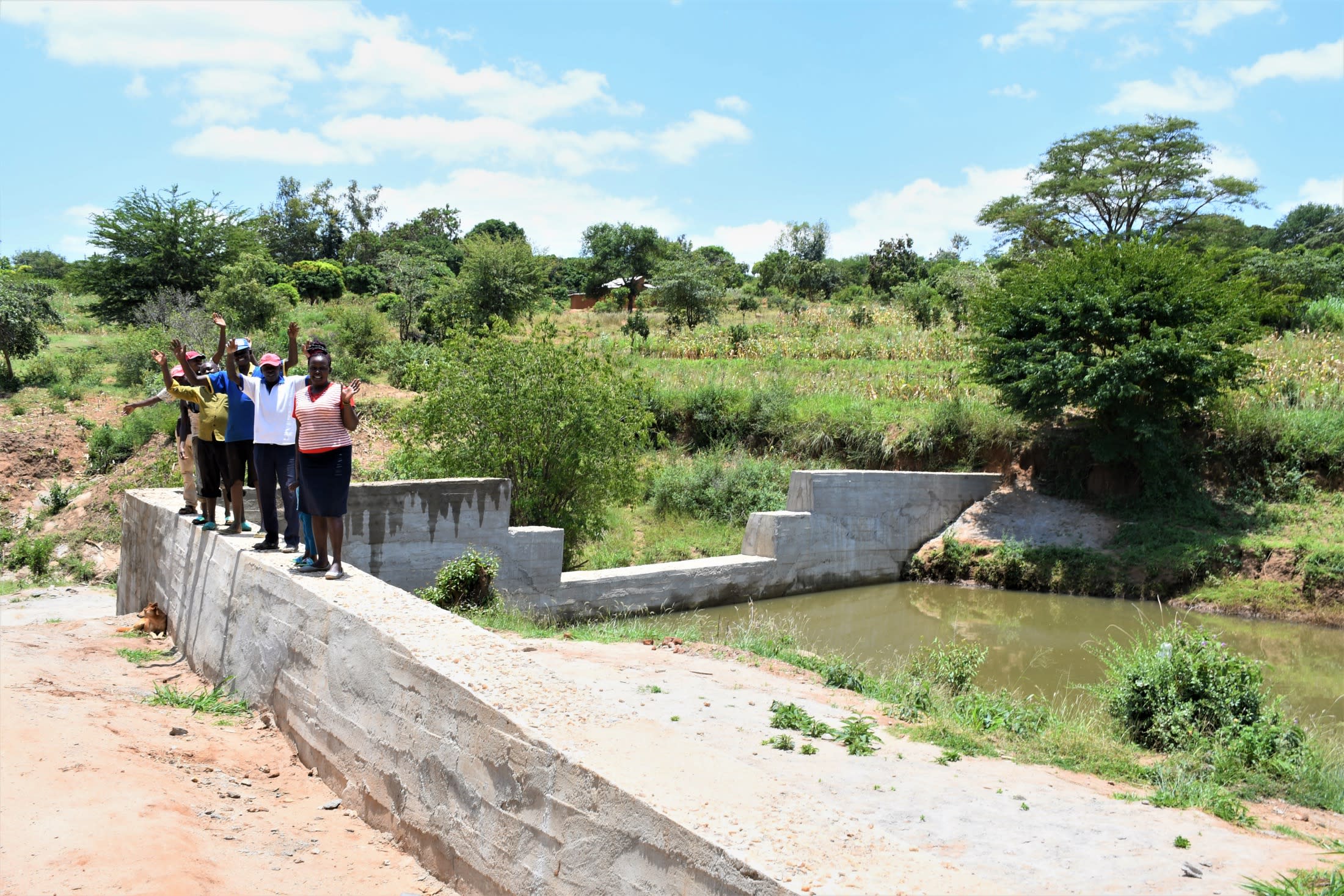Mathanguni community is based in a rural area of southeastern Kenya. It's inhabited by nearly 1,300 community members who are mostly farmers. Our team visited the area during the wet season, and the environment was lush and green due to the recent rains. However, during the dry season, the environment is usually grey with many withered crops. House structures in this area are made of brick and use an iron sheet for the roof.
On an average day, the women wake up at around 6 am to prepare their children for school and cook breakfast for their families. When everyone leaves, they undertake their household duties such as washing clothes, cleaning their houses, cleaning utensils, and taking their livestock for grazing. Once the water in the homestead runs out, they have to walk to the nearest water sources to fetch water. For some people here, the trip to the water source takes around an hour each way. This consumes a lot of their time, and it's very exhausting for them.
The community has a sand dam and hand-dug well that they constructed last year. However, the single water source is not close enough to everyone who lives here. The project provides a reliable source of water, but it is still a burden on many families here. Some people will still go to the open scoop holes in the river beds to get water in order to avoid the long walk. While this saves time, it exposes families to waterborne diseases found in open water sources.
"We have been affected a lot by the challenges of water. The water we attain from the open sources have been making our children ill because they often complain of stomach aches and diarrhea," said Lydia Muteti, a farmer who lives in the community.
Insufficient water supply has led to immense poverty levels as the members mostly rely on farming, and without water, they may lack food to sustain them. It is time-consuming walking to the water sources as it deprives them of time spent on income-generating activities.
"At times we have to buy jerrycans of water from the families with donkeys and its usually expensive," Lydia explained.
What we can do:
Our main entry point into Mathanguni Community has been the Kakwa Self-Help Group, which is comprised of households that are working together to address water and food scarcity in their region. These members will be our hands and feet in both constructing water projects and spreading the message of good hygiene and sanitation to everyone. We worked with this group on a water project last year and will build on their experience to complete a water point that will reach more people here.
Sand Dam
After the community picked the ideal spot, our technical team went in and proved the viability by finding a good foundation of bedrock. Now, our engineers are busy drawing up the blueprints.
We are unified with this community to address the water shortage. As more sand dams are built, the environment will continue to transform. As the sand dams mature and build up more sand, the water tables will rise. Along with this sand dam, a hand-dug well will be installed to give community members an easy, safe way to access that water.
Building this sand dam along with the well in this community will help bring clean water closer to hundreds of people living here.
Training
These community members currently do their best to practice good hygiene and sanitation, but their severe lack of water has been a big hindrance to reaching their fullest potential.
We will hold hygiene and sanitation training sessions with the Kakwa Self-Help Group and other community members to teach about important hygiene practices and daily habits to establish at the personal, household, and community levels. This training will help to ensure that participants have the knowledge they need to make the most out of their new water point as soon as water is flowing.
One of the most important topics we plan to cover is the handling, storage, and treatment of water. Having a clean water source will be extremely helpful, but it is useless if water gets contaminated by the time it is consumed. We will also emphasize the importance of handwashing.
We and the community strongly believe that all of these components will work together to improve living standards here, which will help to unlock the potential for these community members to live better, healthier lives.
We typically work with self-help groups for 3 to 5 years on multiple water projects. We will conduct follow-up visits and refresher trainings during this period and remain in contact with the group after all of the projects are completed to support their efforts to improve sanitation and hygiene.

 Sand Dam
Sand Dam
 Rehabilitation Project
Rehabilitation Project
































